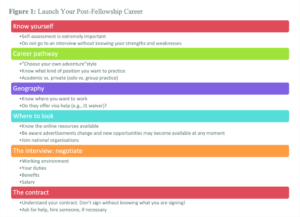

 I am a second-year fellow in rheumatology, and I want to share my personal experience of my job-hunting quest.
I am a second-year fellow in rheumatology, and I want to share my personal experience of my job-hunting quest.
Know Yourself
One of the most challenging parts of entering the job marketplace is self-assessment. There is no training for that. Looking at yourself is not as easy as it sounds. We are trained to be humble and cannot always see where we shine.
Think about what skill sets you have to offer, and write them down.
You want to show what makes you unique and convey that during your interviews. For example, are you good with musculoskeletal ultrasound and have the training and/or certification to use in the clinic? Do you have what it takes to build a subspecialty or procedural clinic? It doesn’t matter if you are going into an academic setting or private practice; the other side always wants to know.
You should also consider whether you need a work visa after fellowship because it will be relevant to the following steps. You may need an immigration lawyer to assist you during the path (see Figure 1).
Career Pathway
Have you thought about what path you want to take? Do you want research to play an important role in your career? Or do you want to prioritize clinical experiences, such as taking care of patients daily?
Most private practices are known for flexible schedules with a “choose your own adventure” style. They want you to be happy in the practice and to consider long-term commitment, so let them know your preferences.
If research, teaching and education are must-haves, then consider academic positions (although private practices may have incorporated some degree of research nowadays, it may not be the same as in academic centers). In the academic positions I have interviewed for, I did notice more flexibility in the schedule. Nothing is written in stone, but you have to advocate for yourself—for the type of work and schedule you want.
Do you get excited with complex patients in the hospital? What cases make you feel you are making a difference? Most academic positions have inpatient work, which is not necessarily true for private practices. You should consider private practice if outpatient is your priority.
After almost a year of fellowship, you have already noticed your preferences between inpatient, outpatient or a combination of both. Consider the path that best suits you.




